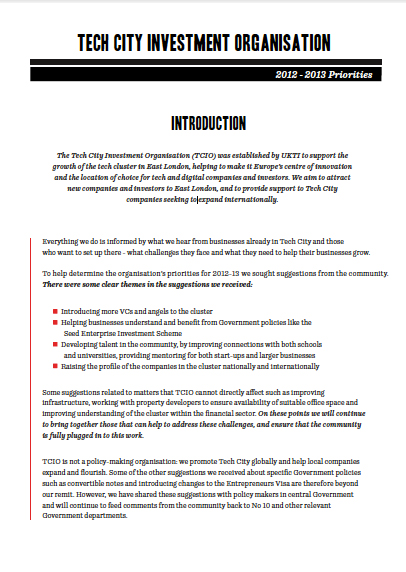The Guardian’s third Tech Weekly Podcast talk on Tech City took place last night, once again at Imperial College London. This week’s theme was intellectual property and copyright, and the recent Hargreaves Report. How realistic are its guidelines? Whose interests are catered for in the controversial Digital Economy Act? And how can people make a living from their digital creations?
A long and lively debate was had, covering off a wide range of perspectives from a passionate and well-informed panel. The full podcast is now available, but if you’d prefer a condensed version you can get a flavour of the debate from the notes below. As ever, please note that it is intended to be an indication of the lines of argument rather than a verbatim transcript – those seeking quotes should refer to the podcast itself.
This week’s panel consisted of:
- Ed Vaizey MP (Minister for Culture, Communications and Creative Industries)
- Professor Ian Hargreaves (Chair of Digital Economy at the Cardiff School of Journalism, Media and Cultural Studies)
- Feargal Sharkey (CEO of UK Music)
- Professor Thomas Hoehn (Director, Intellectual Property Centre, Imperial College London)
- Jeff Lynn (Chairman of Coadec).
Main points raised were as follows:
- The Hargreaves Report was a ‘fast’ review, focusing on the most urgent and important issues. The Review sought to attain a balance perspective on whether there is a way to alter UK Intellectual Property legislation to better foster and cultivate innovation (Professor Ian Hargreaves)
- The impetus for the Report came from the Policy Unit at Number 10, who have a strong focus on the promotion of innovation. The challenge facing Government is the perceived conflict between the creative industries’ reliance on strong IP to protect profits and the desire of innovators to have a more flexible approach to the issue (Ed Vaizey MP, Minister for Culture, Communications and Creative Industries)
- The definition of ‘innovator’ as currently used in the debate is too narrow and restrictive – we need a broader concept of what constitutes innovation. The investment and VC landscape in the UK is in many respects a bigger barrier to innovation than IP legislation (Feargal Sharkey)
- The differences between a Silicon Roundabout entrepreneur & a young musician are relatively slim; there is no natural tension between them (Jeff Lynn)
- The Tech City initiative sends out a clear message that the UK is prepared to create a space to foster innovation of all sorts. London is already seen as an attractive place to come for foreign investment – it is now about creating an environment where policy areas work together across not only IP but taxation, investment, access to finance, culture, etc (Ed Vaizey MP, Minister for Culture, Communications and Creative Industries)
- The UK mustn’t fall into the trap of making negative comparisons with other areas and believing we are not good enough – Silicon Valley knows and acknowledges that the UK is a global hub of creativity; this applies to the whole country. The key question is not so much ‘why are we failing?’ and more ‘why aren’t we doing better?’ (Professor Ian Hargreaves)
- All business types, regardless of sector, need ‘zones of certainty’ – areas where they know their interests will be protected. It’s a government’s job to put those in place – in this case, with regard to IP legislation. The important thing is to protect intellectual property rights, not to defend outmoded business practices. Rather than about importing Silicon Valley, this is about creating and promoting an environment where business can flourish – government can act as a broker and facilitator in this process (Ed Vaizey MP, Minister for Culture, Communications and Creative Industries)
- In 1990, Microsoft had 3 patents. Today, they have over 10,000; this is illustrative of a shift in business model to one based on trade secrets (Professor Thomas Hoehn)
- There is broad consensus that the effects of the extension of copyright law have been negative for the economy as a whole. The point of the Review was to address that, and to look at the (often unintended) manner in which copyright has now come to bear on areas such as search, social etc, where a different approach is perhaps needed (Professor Ian Hargreaves)
- The point of copyright legislation is to foster learning and innovation. When it stops doing that, it needs to be changed (Jeff Lynn)
- Copyright provides a necessary certainty not only for artists but, crucially, for investors as well (Feargal Sharkey)
Let us know what you think in the comments below – or on Twitter @TechCityUK.






Having filed patents in large (10,000+ employees), medium (20 employees) and small (4 employees) companies, it is clear the patent process in both the EU and the US is stacked in favour of big companies. Additionally the process is extremely slow.
Assuming the current system isn’t going to change drastically any time soon, it would be fairly easy to make the system a little more balanced by offering a patent grant (say ~£10,000) for an early company’s first patent. Additionally free fast tracking patents for companies less than 100 employees.
This would make it easier for IP (patent) generating companies to play in the same pond as the big guys without over hauling the whole system (which would by my preference but seems unlikely).